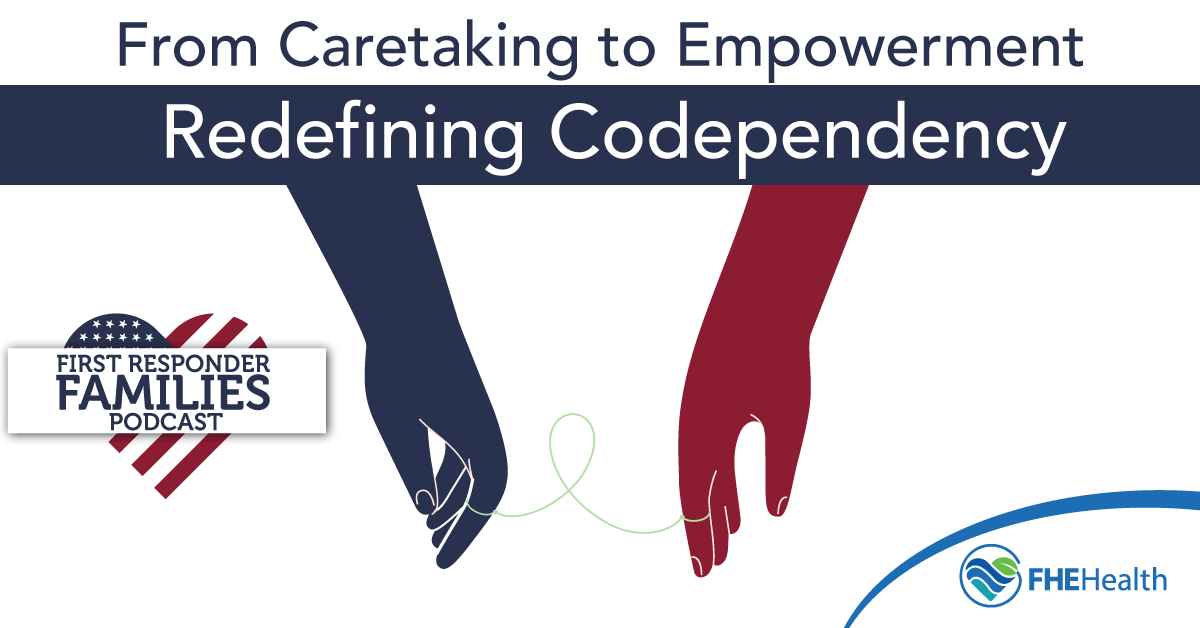
The term “codependency” has been around for decades and become a bit of a buzzword in the world of behavioral health — particularly as it relates to families affected by addiction and substance abuse. But new findings in neuroscience and developmental neuroscience, the treatment of trauma, and human behavior have changed how mental health experts understand codependency and their approaches to it.
In this Episode 14 of The First Responder Families Podcast, host Ivona Bhadha, LCSW, FHE Health’s Director of Family Services, interviewed Dr. Sachi Ananda, Ph.D., LMHC, MCAP, about codependency as it affects first responders and their loved ones. Dr. Ananda is the program director of Shatterproof FHE Health. The peer support program utilizes the latest trauma therapies and neuroscience-based treatments to treat first responders with substance use and co-occurring mental health disorders like PTSD.
Read on to catch some of the questions covered in Dr. Ananda’s conversation with Bhadha….
Questions About Codependency: Some Episode Highlights
In this section, you’ll get a peek at some of the questions that our experts addressed, starting with a definition of codependency and how it has evolved over the past 40 years.
What is codependency according to its traditional understanding?
Here, Dr. Ananda referenced Melody Beattie, “the big founder of codependency,” whose work on the subject depicted it in terms of “having an addiction” to the anxious “caretaking of somebody else’s needs, in detriment to your own.” “Codependency,” understood within this framework, is more of an undesirable “flaw or trait that you have to fix or get rid of.”
How has our understanding of codependency evolved?
Today, our understanding of codependency has evolved: It’s now viewed as a “survival strategy,” often acquired during childhood as a response to dysfunctional family dynamics; and “some people have more of a tendency to adopt it” than others.
Here is how Dr. Ananda explained it:
I think it’s really valuable to understand codependency in that survival context, and how we were raised, and our relationship to our major caregivers, and family members in our lives growing up. How much was that value, action or behavior of taking care and considering others above yourself just a way to survive every day in a traumatic family or a dysfunctional family or just even just a stressed-out family?
Dr. Ananda then gave an example of how codependency might develop as a survival mechanism: a child going through their parents’ divorce. In the process of “losing the family system as a whole” and not having consistent care from one or both parents who are stressed out, the child “develops a certain belief system based on the event, and they may start thinking as a child, you know, in terms of, I have to disconnect from my needs in order to make sure that Mom or Dad are not, you know, stressed out if I need them.” Codependency thus evolves as a misguided effort to find “some sort of sense of safety and security in their emotional relationships.”
Codependency understood in these terms — as a survival mechanism that is no longer effective rather than “a flaw that needs to be fixed or gotten rid of” — can seem less daunting to address.
How might this newer understanding of codependency apply to first responders and their families?
“Many first responders may grow up in households where they were trained and or defaulted to having been the rock or the person who helped others be responsible at a young age,” Dr. Ananda said. “I think that’s why first responders … might even become first responders … because they already know and are comfortable and feel safety and security in being that helper, because that’s where they were. That was their jam growing up. That’s how they got their self-esteem, their self-worth, their validation. And it almost naturally would make sense that they would become, as a profession, a helper and a rescuer.”
How do we know when codependency has become damaging?
“How do we know when codependency has become an addiction of helping others where it’s actually damaging ourselves,” especially within a first responder family where helping others is “who we are and what we do?” Bhadha asked. Some signs might be neglecting your own needs, disconnecting from your emotions, mental and physical exhaustion, and/or feelings of anxiety or depression when you’re faced with an accumulation of stress.
More About Our Podcast and Shatterproof FHE Health
For more answers to your questions about codependency and ways to address it, we invite you to check out the full Episode 14 of the First Responder Families Podcast here.
The First Responder Families Podcast is a free wellness resource from FHE Health and is an extension of our commitment to first responders through Shatterproof FHE Health, our specialized treatment program for first responders. Each episode tackles an issue that affects families of first responders, with insights from our experts in trauma, relationships, and mental and behavioral health.






